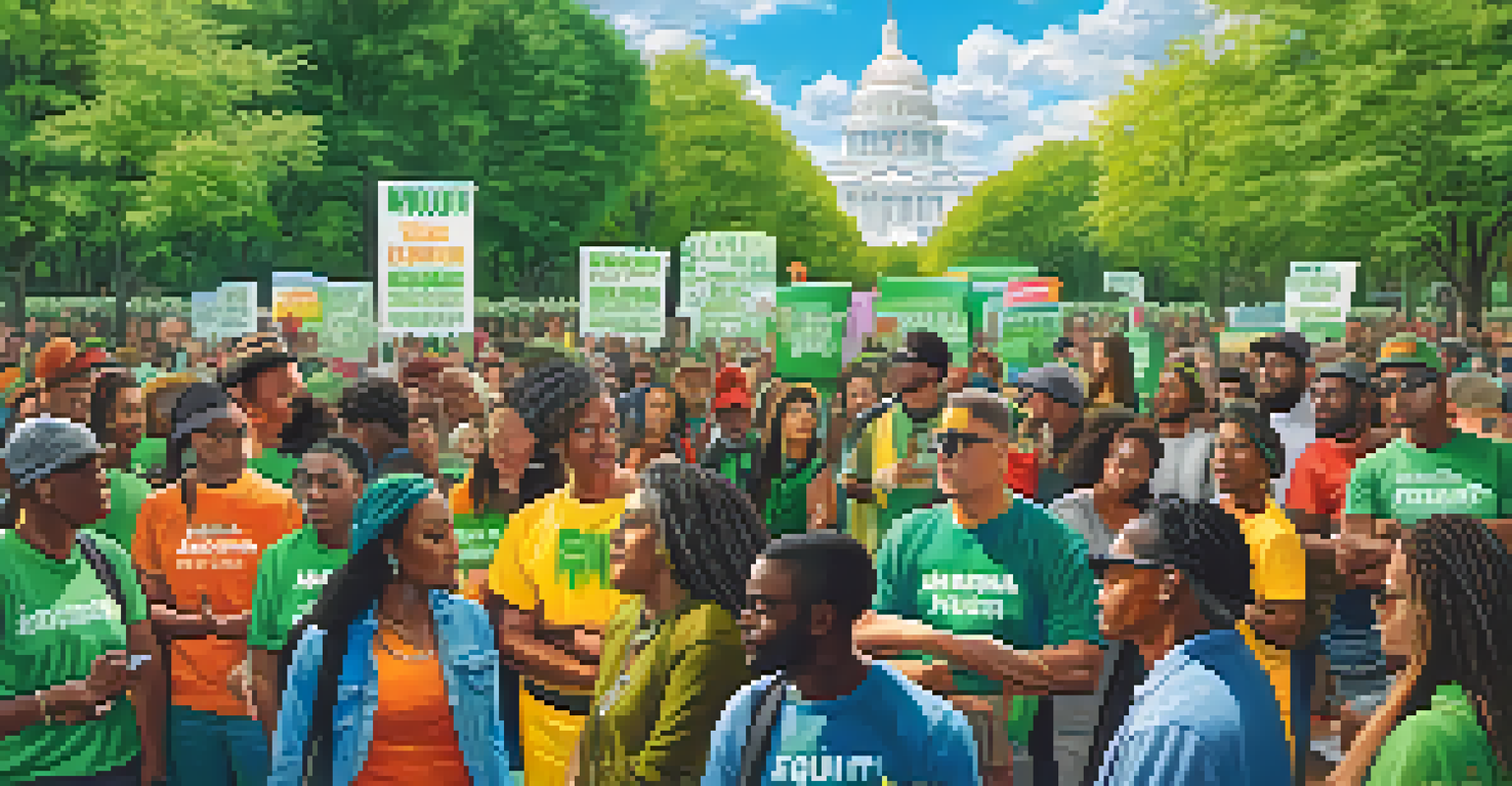Marijuana Legalization: A Path to Racial Justice?

Understanding the Historical Context of Marijuana Laws
To grasp the connection between marijuana legalization and racial justice, we must first look at the history of marijuana laws. Historically, these laws have disproportionately targeted communities of color, leading to mass incarceration and systemic inequalities. For instance, despite similar usage rates, Black individuals have been arrested for marijuana offenses at far higher rates than their white counterparts.
The war on drugs has disproportionately impacted communities of color, and it is essential to address these historical injustices as we move towards legalization.
The origins of these laws can be traced back to the early 20th century, when marijuana was demonized in part due to xenophobia and racial stereotypes. This historical context has created a legacy of distrust and harm that affects communities today. Understanding this background is essential to appreciate why legalization is often viewed as a necessary step towards racial equity.
By recognizing the historical injustices tied to marijuana prohibition, we can better understand the urgency of reform. Legalization isn't just about lifting bans; it's about addressing decades of harm inflicted on marginalized communities, and rectifying the past.
Current Legal Landscape and Racial Inequality
As of now, the legal landscape surrounding marijuana varies significantly across the United States. Some states have fully embraced legalization, while others continue to enforce strict prohibitions. This patchwork of laws has perpetuated racial disparities, as Black and brown individuals are still more likely to face legal repercussions in states that haven't legalized.

The ongoing enforcement of outdated marijuana laws often intersects with other social issues, such as poverty and lack of access to education. Communities that have borne the brunt of these laws face numerous barriers that make it difficult to thrive. Legalization can help dismantle some of these barriers, paving the way for more equitable opportunities.
Marijuana Laws and Racial Injustice
Historical marijuana laws have disproportionately targeted communities of color, leading to systemic inequalities and mass incarceration.
Moreover, states that have legalized marijuana have the chance to implement restorative justice measures that can help heal communities. By prioritizing equity in the cannabis industry, such as ensuring minority ownership and investment in affected communities, we can work towards a more just society.
Economic Opportunities in Legalized Marijuana Markets
Legalizing marijuana opens up a host of economic opportunities, particularly for communities that have historically been marginalized. The cannabis industry has shown remarkable growth, with billions in revenue potential that can benefit local economies. However, if these opportunities aren't accessible to everyone, we risk perpetuating existing inequalities.
Legalization is not just about the substance; it's about the people who've been harmed by the laws that criminalize them.
Creating pathways for minority entrepreneurs to enter the cannabis market is essential. This includes access to funding, training, and mentorship programs that can help level the playing field. When diverse voices are included in the industry, we can foster innovation and ensure that the benefits of legalization are equitably distributed.
Additionally, tax revenues from legalized cannabis can be reinvested into communities most impacted by the war on drugs. These funds can support education, healthcare, and other vital services, helping to uplift neighborhoods that have faced systemic neglect.
The Role of Social Justice in Legalization Efforts
Social justice movements have played a crucial role in advocating for marijuana legalization. Activists have highlighted the racial disparities in drug enforcement and have called for policies that prioritize equity. Their efforts have sparked meaningful conversations about how legalization can be a tool for racial justice.
In many cases, social justice advocates have pushed for the expungement of past marijuana convictions. This not only relieves individuals of the burdens of their records but also allows them to fully participate in society and the economy. Such measures are essential for addressing the long-term impacts of criminalization on communities of color.
Economic Opportunities from Legalization
Legalizing marijuana can create significant economic opportunities for marginalized communities if equitable access is prioritized.
Moreover, integrating social justice into legalization efforts can lead to more inclusive policies. By ensuring that marginalized voices are heard and considered, we can create a framework that genuinely promotes equity and justice in the cannabis sector.
Public Opinion and Support for Legalization
Public opinion on marijuana legalization has shifted dramatically over the past few decades. A growing majority of Americans now support legalization, recognizing its potential to address social injustices. This shift has not only influenced policymakers but has also empowered communities to advocate for their rights.
Surveys indicate that many people see legalization as a way to rectify past wrongs and reduce racial disparities in drug enforcement. This burgeoning support can lead to more comprehensive and equitable policies if harnessed effectively. The voices of those who have been most affected by marijuana laws must be central in shaping these policies.
As public support continues to grow, it's crucial for advocates to maintain momentum and push for legislation that prioritizes justice and equity. This collective effort can help ensure that legalization serves as a pathway to a more just society.
Challenges and Barriers to Effective Legalization
Despite the momentum for marijuana legalization, several challenges and barriers remain. One significant issue is the ongoing stigma surrounding cannabis use, particularly in communities that have been adversely affected by drug policies. This stigma can hinder open discussions about legalization and its potential benefits.
Additionally, there are regulatory hurdles that can complicate the establishment of a fair cannabis market. Issues such as licensing, taxation, and zoning laws can disproportionately impact small businesses and minority entrepreneurs. Addressing these challenges is essential to ensure that the benefits of legalization are accessible to all.
Social Justice Drives Legalization Efforts
Activists advocate for marijuana legalization as a means to address racial disparities and promote equity in drug enforcement.
Furthermore, the absence of a cohesive federal policy leaves many states in a precarious position. Without uniform regulations, disparities between states can exacerbate existing inequalities and create confusion for those wanting to enter the cannabis market.
Moving Forward: Steps Toward Equitable Legalization
To truly harness the potential of marijuana legalization as a path to racial justice, several steps must be taken. First, policymakers should prioritize equity in the formulation of laws and regulations. This includes prioritizing the voices of marginalized communities and ensuring their representation in the cannabis industry.
Second, states should implement restorative justice measures that address the harms caused by past marijuana prohibitions. This can include expungement of records, reinvestment in affected communities, and providing opportunities for minority ownership in the cannabis market. These initiatives are vital for healing and rebuilding trust.

Lastly, ongoing education and advocacy are needed to shift public perception and reduce stigma. By fostering open conversations about cannabis and its societal impacts, we can create an informed public that supports equitable legalization. Together, these steps can guide us toward a future where marijuana legalization genuinely serves as a tool for racial justice.